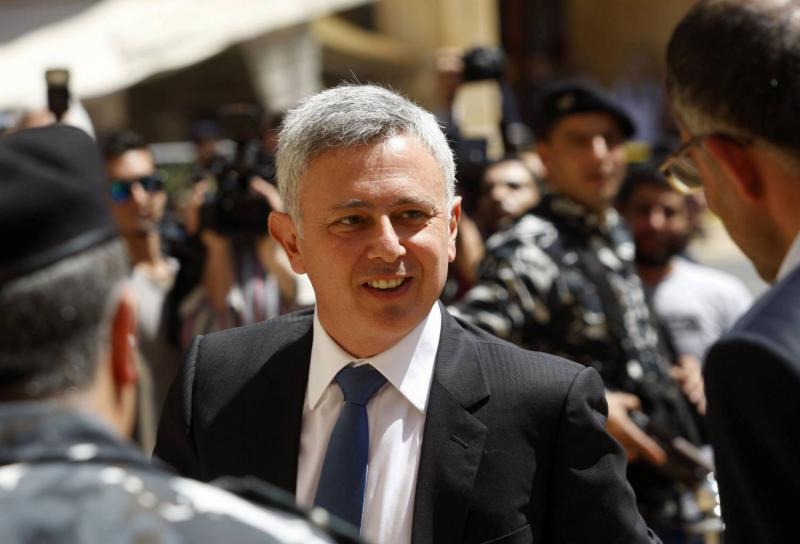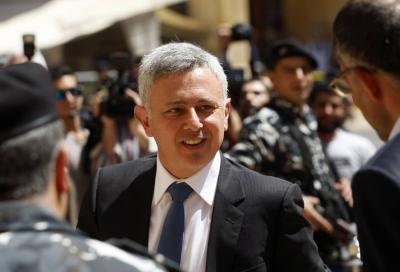After a week filled with financial and banking disruptions on one hand, and political intensifications on the other, the internal scene seems headed towards new labyrinths of confusion, uncertainty, and the burdensome repercussions of political conflict, in addition to the pressures of general collapse. If the recent stances of House Speaker Nabih Berri, who is leading the support for the candidacy of the head of the Marada Movement, Suleiman Frangieh, for the presidency, continue to shape the core of political and media tensions in the presidential crisis, it is noteworthy that the uproar created by Berri has been limited to the diminishing disputes between Ain al-Tineh and MP Michel Moawad. Meanwhile, other allies of Berri have not stepped onto the scene, leaving it open to reactions, which raises further questions about the dimensions and goals of Berri's true position in rushing to become the spearhead in Frangieh's battle.
Consequently, all eyes are naturally directed towards the speech that Hezbollah's Secretary-General, Sayyed Hassan Nasrallah, will deliver on Monday during the party's commemoration of "Injured Day" to see whether he will publicly join Berri in endorsing Frangieh after Berri revealed that Frangieh is "our team's candidate," or if Nasrallah will maintain a policy of implicit support for Frangieh without an announcement. The political implications of either scenario will be critical in addressing the backgrounds that any position announced by Nasrallah will create regarding the ongoing presidential crisis.
In a new stance from the opposition forces, yesterday, the head of the Lebanese Forces Party, Samir Geagea, expressed that he was not surprised by Berri's endorsement of the Marada Movement leader, emphasizing that "he was aware since the start of the constitutional period for electing a president six months ago that the serious and actual candidate of Hezbollah, Berri, and their allies is Suleiman Frangieh." In an interview with "The Independent" Arabic, Geagea stated, "Based on this, our reaction was to refuse the artificial calls for dialogue, as they would be a waste of time as long as the other side clings to its candidate. The biggest proof is what was issued by President Berri." He stressed that "the actual obstruction of the presidential act is Hezbollah's refusal of a genuine candidate for Lebanon."
Regarding his advanced position in the context of obstructing election sessions, Geagea noted that this stance is unrelated to any new developments or data regarding the possibility of Frangieh's ascension. He reminded that "up until yesterday, we were still demanding adherence to constitutional procedures and holding open election sessions, and we were prepared to accept the results even if their candidate won. However, after five months of presidential vacancy and their decision to change the rules of the democratic game and obstruct the constitution while waiting for their suitable timing, this is what we completely refuse, considering that 'humanity is one thing, integrity is another, while oppression is something else'. No one should expect us to be fools and accept being obstructed at their convenience, only for them to come in a moment of time, after securing the conditions for their candidate's success, to ask us to facilitate his entry."
While revealing that he had received offers to support Frangieh for the presidency, Geagea did not deny that he had been approached by several domestic and foreign entities in an attempt "to convince me to accept Frangieh for the presidency in exchange for a prime minister close to the opposition, which I rejected."
Geagea also delivered a speech during the 29th anniversary of the explosion of the Saydet al-Najat Church in Dhour al-Mashq, in which he compared the explosion of the Church of Our Lady of the Salvation to the Beirut port explosion. He emphasized "the shared pain and the loss of civilian victims, as well as the same perpetrator being responsible in some way, considering they belong to the broad front known as 'the resistance.' However, he pointed out that 'the fundamental difference is that the crime of the Saydet al-Najat explosion was executed with prior intent to accuse the forces of it, while the Beirut port crime is unlikely to be such.'"
He further stressed that "we are awaiting the investigations to prove or disprove this theory to reveal the truth about the devastating explosion that claimed hundreds of lives and thousands of injuries, along with significant material damages." He explained that "in the case of the church explosion, investigations were conducted to 'frame it' for another group, while in the Beirut port explosion, they are obstructing the investigation in various ways, as the chief investigator was appointed and forced to resign, after which another investigator was appointed who insisted on continuing and did not back down despite all the pressures, leading to the obstruction of the judiciary." He noted that "the responsible parties for this obstruction are individuals from the same alliance, the resistance axis; this is their method, and since their inception, they do not want truth, justice, or transparency, but prefer ambiguity and darkness because 'the culprits are behind all these crimes in one way or another.'"
Furthermore, a notable stance was recorded by the head of the Kataeb Party, MP Sami Gemayel, who stated that "Speaker Berri is no longer a neutral council president but has become a political team that opens the council according to what suits his team. Thus, we must closely monitor the voting process; suffering for a month or two to elect a president is better than suffering for six years under a term similar to the previous one." He said, "The duo of Amal and Hezbollah has opened its battle but has not yet reached a majority of 65 votes for Frangieh; otherwise, Berri would have called for a session since those who will obstruct the quorum have not yet reached a third of the council's members." Gemayel confirmed that "we will obstruct any staged session to bring Hezbollah's candidate, clarifying that the veto against Frangieh is internal." He revealed that some diplomats trying to find solutions at any cost suggested the idea of a president affiliated with March 8 in exchange for a prime minister who would please the Arabs and the West, but "we categorically rejected it as illogical since it satisfies Hezbollah's team."
Amidst this, information circulated that Bkirki will invite all Christian MPs to a meeting after preparing the agenda and the points that the resulting statement may include. The information added that "the Strong Republic bloc will determine its position on the invitation at the beginning of the week after its meeting and is waiting for the agenda of the meeting to take appropriate action." It reported that "the Free Patriotic Movement" and the "Tashnag" party confirmed their participation in the meeting.
In the context of calls for dialogue, the Progressive Socialist Party renewed its call for dialogue, considering that "all formulas, names, and suggestions do not seem, so far, to be following the correct path to reach the election of a president. If some are still betting that the outside will substitute for the inside, they are mistaken. If the initiative does not come from within the Lebanese political forces through open dialogue, which avoids all forms of leveraging, there will be no election of a president."
For its part, the Higher Islamic Sharia Council expressed "serious concern over the failure to elect a new president whose election would be an entry point for comprehensive national solutions, and a basis for the return of stability, reassurance, and confidence both inside and outside, especially with our Arab brothers," emphasizing "there is no substitute for Lebanon except Lebanon. There is no alternative to national unity except through national unity. There is no message for Lebanon except the message of humanitarian brotherhood and equality in citizenship based on co-existence." The council called on "the Parliament and the political and party leaders, despite their differences and diversities, to reach a national agreement that leads to the election of a president capable of upholding the constitution, sincerely adhering to the Taif Agreement, and working to strengthen the bonds of national unity."




